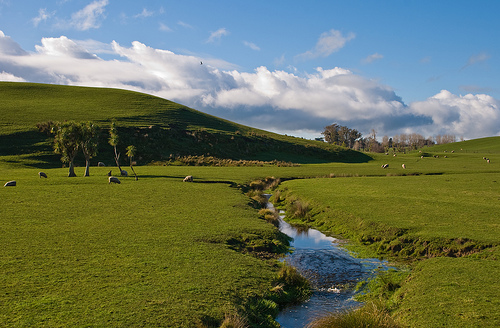Despite long being New Zealand’s most profitable industry, agriculture continues to have difficulties attracting the manpower it needs to preserve its place at the forefront of global innovation and productivity.
According to those involved in the industry, the issue is not one of economic viability, as agriculture continues to produce a significant proportion of New Zealand’s exports while offering annual wages that exceed those of workers in other industries by an average of $5500.

Rather, it’s one of image. Agricultural workers such as Bay of Plenty dairy farmer Ian Bell feel that agriculture has been “dumbed down†as a career choice, and consequently many university students are turned off the prospect of “milking cows†for a living, without realizing that there’s a lot more to agriculture then manual labor.
This false perception needs to be addressed, and agriculture needs to be presented as the dynamic and skills-intensive career choice it is, so that graduates will begin to view it as a viable career option.
Else the industry will suffer the effects of skill shortages that are already purported to be reaching crisis levels.
NZ a world leader in agriculture
Its relatively small size and geographically isolated position may lead some to underestimate the impact New Zealand has on the global market, but it remains the world’s largest exporter of dairy.
Agriculture contributed two-thirds of New Zealand exports in 2006-2007 (Wikipedia) and, together with fisheries, 72% of its exports in 2012.
Some even joke that New Zealand’s population of sheep exceeds that of its people. But the last laugh is had by Kiwi farmers, who find themselves in prime position to feed a growing global population.
They are especially well placed to meet demand from China, which has roughly a fifth of the world’s people, but with only 7% of its arable land with which to feed them.
However, economic opportunity alone is not enough to draw young New Zealanders who, much like the central characters of certain cinematic trilogies produced on their shores, would rather pursue more adventurous career opportunities.
Entry-level positions in agriculture may receive 40% more pay than the average arts graduate, but of the 22,820 degrees awarded in 2011, only 68 were for agricultural sciences and 90 for farm management, versus 650 for performing arts and 334 for mathematics.
Dairy NZ claims that 1250 agriculture graduates per year are needed if the industry is to meet future demand.
More needs to be done to promote New Zealand agriculture as a sophisticated industry that requires good management and problem-solving skills.
Not only that, many of the most pressing issues facing the world today, such as sustainability, poverty and hunger, are issues that agricultural innovation can have a hand in solving.
So those who choose to pursue a career in agriculture have the chance to participate in formulating new technologies and methods that can help change the world.
Job opportunities in agriculture
Skills are in high demand in New Zealand agriculture, particularly management skills, and those interested in working in New Zealand will find no shortage of job opportunity, particularly in the highly profitable fields of agricultural science, dairy, forestry, viticulture and beekeeping.
Organizations such as Farm Relief Employment Services (FRES) can assist overseas workers in finding temporary or permanent positions in the New Zealand agriculture industry, and the Immigration New Zealand website provides information on what it’s like to live and work on a dairy farm.
There are a number of visa options are available to skilled migrants, some of which can serve as a stepping stone to permanent residence in New Zealand.
Matthew Flax is concerned about the shortage of farmers in New Zealand, lest the trolls on the Middle Earth film set run out of sheep and decide to start eating hobbits instead. That’s why he’s a fan of job sites that specialise in international employment opportunities, such as Skilledmigrantjobs.com, because they can help ensure that countries keep their people (and not trolls) fed.

Leave a Reply